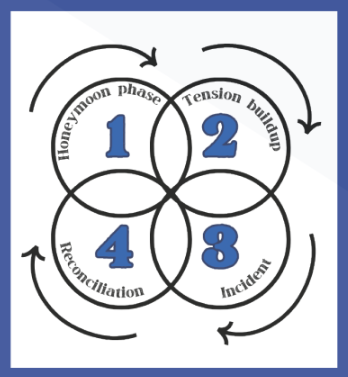
According to the CDC, approximately half of all men and women have experienced emotional abuse by their partner in their lives. According to Prevention and Wellness Coordinator, Amy Dillon, she has had numerous conversations with students about abusive relationships at VHHS.
VHHS social worker, Doug Dusthimer, said that one of the most common warning signs of an abusive relationship is an extreme amount of control.
“They tend to like to know where you are, who you’re hanging out with and try to limit other threats to them in their life. They won’t want you to talk with your friends or they want to check your phone to make sure there aren’t other people. This is their trust issues coming up. They want to isolate you from other people,” Dusthimer said.
According to Dusthimer, an abuser will shrink your world. This could manifest into the abuser constantly checking your phone or telling you who you can and cannot be friends with. Dusthimer explained that if the person being abused were to try to escape the relationship, there would be consequences.
“They’d yell at you, it might be physical, or it might just be emotional, like abuse and cut downs, like, ‘you’re nobody without me,’ ‘you’re never going to make it without me.’ Those kinds of manipulations are to keep that person in check,” Dusthimer said.
Dusthimer compares abusive relationships to a border collie pulling their owner around on a walk.
“It is kind of like how a border collie will always try to corral you into where they want you to go, what they want you to do, what they want you to say, and what they want you to think,” Dusthimer said.
Social studies teacher, Eileen Baranyk, understands feelings of frustration, but believes that abuse is always intentional.
“All of us have moments where we’re really furious or frustrated about something. But, you have the ability as a thinking individual to take a step back, and to choose not to harm someone and to walk away. So if you’re choosing to harm someone, that is a choice and that is intentional,” Baranyk said.
Dillon expanded on the idea of control in an abusive platonic relationship, as well. She explained that students who frequently come to her about abusive friendships often bring up the fact that their abusive friend tries to isolate them from their other friends and manipulate them into doing things they don’t want to do. These actions make it hard to recognize the abuse, according to Dillon.
“Sometimes you don’t even see it, or we don’t notice it. That’s control. It’s all about control,” Dillon said.
According to Dillon, there are certain emotions you should be on the lookout for that may signify that you are in an abusive relationship.
“If you notice that you used to be more outgoing and see your friends…Pay attention to that feeling like you’ve lost your voice and your opinion. A lot of times people just like to mold opinions with the other person,” Dillon said.
According to Dillon, there are reasons why someone can’t just leave their abusive relationship.
“The abusive self may not be working for you, but the relationship is. It’s feeding some needs that you have, and that’s where people get stuck. It’s good like a normal relationship, and then there’s an abusive situation or ongoing abuse,” Dillon said.
There is a cycle of abuse that allows the relationship to continue, according to Dillon.
“Oftentimes, the abuser might apologize or buy presents to make it up to you in some way. Or they might trick you into thinking that you’re the crazy one, like you’re making this up and then it just goes around and around. You can’t always see it so clearly,” Dillon said.
Dusthimer shared that the trauma of an abusive relationship can follow into an individual’s next relationship.
“It’s kind of a form of PTSD…We might have trust issues with other people…we might enter relationships and do way more investigating of a person than we normally would because of a trust issue. We might hear what they say and be much more suspicious of what they say because we’ve perhaps been manipulated before,” Dusthimer said.
Dillon conveyed a similar statement in the sense that trust issues were a common theme.
“It can make trusting very difficult. It can make you put up walls to try to protect yourself…not want to be in a relationship or friendship…It can also make you think that you deserve that,” Dillon said.
Dillon added on to that statement that this is where peoples’ ‘types’ come in.
“That’s sometimes where we see people have a ‘type’ where they go after the stereotypical bad boy who mistreats you because that’s the way you think you’re supposed to be treated because they trick you into thinking that’s what love is,” Dillon said.
According to Dillon, abuse can happen to anyone.
“Abuse, just like mental health, doesn’t discern against race, social economic class, or anything. It can affect anybody…It happens everywhere,” Dillon said.
RESOURCES:
- Talking to a trusted adult
- Talking to a trusted friend that has the strength to share their strength with you
- Text a Tip offers emotional support to Middle and High School students
- 988 is a nationwide number that provides immediate crisis intervention.
- The Trevor Project is a suicide prevention organization focused on the LGBTQ+
- The Zachariah Center offers counseling and advocacy for survivors of sexual abuse and assault.
